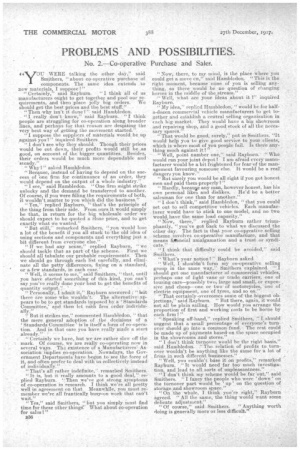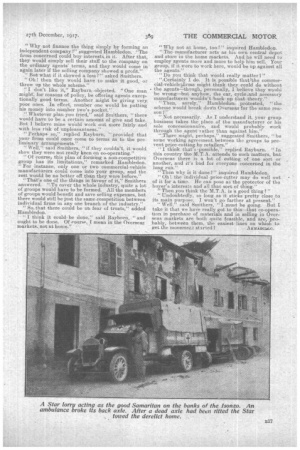PROBLEMS . AND. POSSIBILITIES.
Page 12

Page 13

If you've noticed an error in this article please click here to report it so we can fix it.
No. 2.—Co-operative Purchase and Sales.
6 4 OU WERE talking the other day," said
Smithers, "about co-operative purchase of , components. The same idea extends to new materials, I suppose l" • "Certainly,' said Rayburn. "I think all of us_ • manufacturers might to get together and pool our requirements, and then place jolly big orders, We should get the best prices and the best stuff." . "Then why isn't it done? " said lissubledon. . "I really don't know," said Rayburn. "I think people are struggling for co-operation along broader lines, and perhaps for that reason are despiting the very best way of getting the movement started." "I suppose the suppliers of materials would be up against you?" inquired Smithers.
" 1 don't see why they should. Though their prices would be cut down, their profits would still be as good, on account of the bigger, quantities. Besides, their orders would be much more dependable and
"steady." .
' " Why ? " asked Hambledon.
"Because, instead of having to depend on the success of one firm for continuance of • an order, they wculd depend on the output of a whole industry." "I see," said Hambledon. "One firm might strike unlucky and the demand be transferred to another. Of course, if you were filling the requirements of both, it wouldn't matter to you which did the business." "Yes," replied Rayburn, " that's the principle of the thing from their side. From ours it would simply be that, in return for the big wholesale order we should expect to be quoted a close price, and to get exactly what we wanted." "But still," remarked Smithers, "you would lose a lot of the benefit if you all stuck to the old idea of using sections and components and everything just a bit different from everyone else." • "If we had any sense," replied Rayburn, "we should tackle that as part of the scheme. First we • should all tabulate our probable requirements. Then we should go through each list carefully, and eliminate all the petty differences, fixing on a standard, . or a few standards, in each ease."
"Well, it seems to me," said Smithers, "that, until you have started something of this kind, you can't say you've really done your best to get the benefits of quantity output'? `
" PersonallysI admit it," Rayburn answered ; "kit there are some who wouldn't. The alternative' ap
pears to be to get standards imposed by. a 'Standards Committee,' and then let each firm order individu: ally."
4.` But it strikes me," commented Hambledon, "that the mere. general adoption of the decisions of a ' Standards Committee ' is' in itself a form of co-operation, • And in that case you have really made a start
already." ' • • • .
" Certainly we have, but we are rather slow off the : mark. Of course, we are really co-operating now in several ways. The existence of a Manufacturers' • As
sociation implies .co-operation. Nowadays, the Government Departmentshave .begun to see the force of it, and often prefer to deal with us collectively instead
of v .
." That's all rather indefinite," rernarised Smithers. ".It is, but it really amounts to a good deal," replied -Rayburn. ". Then we've got strong symptoms of co-operation in research.I think .we're all pretty well in _agreement on that Meanwhile, you must remember we're all frantically busy-on work that 'can't
wait."
"Yes," said Smithers, "hut you simply must find
• time for these other thing?' What about co-operation for sales'? " 336 "Now, there, to my mind, is the place where•you could get a move en," said Hambledon. • "This is the right moment, because none of you is selling anything, so there would be no qiiestion of changing horses in the 'middle of the stream."
"Well, what are your ideas about it ?" inquired Rayburn. • . ' ." My idea," replied Hambledon, "would be for halfa-dozen commercial vehicle manufacturers to get together and establish a eeritral selling organization in each big-Markets They would have a big shoWrooth and repairing shop, and a goodstock of all the neees-• iary spareS." • • • • That would be good, surds's" put in Smithers. "It would help you to give good service to your clients, which is Where most of you people: fail. Is there any thing much against it ? " . "Well, point number one," said Rayburn. " WhO would run your joint depot ? Tam afraid every manufacturer would be a bit frightened for fear 'of the management favouring someone else. It would be a real dangers you know." ' "But surely you would be all right if you got honest men and paid themproperly ? " ■ "Hardly, becauie a•ny man, however honest, has his own personal likes and dislikes.. He'd be a better salesman for one than for another."
"I don't think," said Hambledon, "that you could set out to sell competitive vehicles. Each manufacturer would have to stick to one model, and no two would have the same load capacity." . "Now, sv, there," replied Rayburn rather triumphantly, "you've got back to what we discussed the other day. The fact is that your co-operative selling scheme involves co-operative manufacture, and that means forancial amalgamation and a trust or syndicate."
"I think that difficulty could be avoided," said Sinithers.
" What's your notion ? " Rayburn asked.
"Well, I shouldn't form my co-operative selling group in the -same way," Smithers explained. ".I should get one manufactarer. of commercial vehicles, perhaps one of light vans or trade carriers, one of touring-cars—possibly two large and small, or expensive: and cheap—one or twoof Motorcycles, one of
electric equipment, one of tyres, and so on." . _ "That certainlynvereomes some of the biggest ob: jections," said Rayburn. " But there, again, it would not all be plain sailing.. How would you arrange the proportion of first and working eosts to be borne by each firm ? " •
• " Speaking off-hand," replied Smithers, I. should suggest that a smallpercentage: of everyone's turnover should go into a common funds The rest could be 'made up of payments based on the space occupied in the showrooms and stores.". . .
" I don't think turnover would be the right basis," 'said Hambledon. ." The relation of profits to turnover wouldn't be anything like the Same for a lot of firms in such differeut businesses." . "Well, you couldn't base it on profits," remarked Rayburn. "It would need far too much investigation, and lead to all sorts of unpleasantness." .• s
• "I don't think my scheme would be far out," said Smithers. "I fancy the people who were 'down' on the turnover part would be 'up' on the qUestion of storage and showroom space." "On the whole, I think you're right," Rayburn agreed. "All the same, the thing would want some delicate adjustment."
"Of course," said Smithers. " Anything worth doing is generally more or less difficult". "Why not finance the thing simply by forming an independent company '1" suggested Hambleclon, ,"The firms concernedcould buy interests in it. After that, theywould simply sell their stuff to the company on the ordinary agents' terms, and they would come in again later if the selling company showed a profit." But what if it showed a loss?' asked Smithers. "Oh ! then they would have to make it good, or throw up the whole scheme."
"I don't like it," Rayburn -objected. "One man might, for reasons of policy, be offering agents exceptionally good terms. Another might be giving very. poor ones. In effect, number one would be putting his money into number two's pocket."
"Whatever plan you tried," said Smithers, "there would have to be a certain amount of give and take. But I believe mine would work out more fairly and with less risk of unpleasantness."
"Perhaps so," replied Rayburn, "provided that your firms could once come to terms as to the preliminary arrangements." "Well," said Smithers, "if they couldn't, it would show they were not really keen on co-operating."
"Of courses this plan of forming a non-competitive group has its limitations," remarked Harnbledon. "For instance, only one or two commercial-vehicle manufacturers could come into your group, and the rest would be no better off than they were before."
"That's one of the things in favour of it," Sinithers answered. ".To cover the whole industry, quite a lot of groups would have to be formed. All the members of groups would benefit and save selling expenses, but there would still be just the same competition between individual firms in any one branch of the industry." " So_ that there could be nb fear of trusts," added Harnbledon.
"I think it could-be done," said Raybuirn, "and ought to be done. Of course, I mean in the Overseas markets, not at home." "Why not at home, too ? " inquired Hambledon. •
"The manufacturer acts as his own central depot and store in the home markets. And he will need to employ agents more and more to help him sell. Your group, if it-were to work here, would be up against all the agents."
"Do you think that would really matter 1 " ",Certainly I do. It is possible thathhe commercial-vehicleit.firms might think they could do without the agents—though, personally, 1 believe they would be wrong—but anyhow, the car, cycle•;and accessory manufactucers wouldn't !back up that theory." "Then, surely," Hambledon, protested, "the scheme would break down Overseas for the same reason.1"
" Not necessarily. As I understand it, your group business takes the place of the manufacturer or his sole concessionnaire, and would probably work through the agentrather than against him.'
"There might, perhaps," suggested Smithers,." be some working agreement between the groups to prevent price-cutting by retailers." "I think that's 'possible," replied Rayburn. "In this country the M.T.A. attends to such matters, but Overseas there is a lot of cutting of one sort or another, arid it's bad for everyone concerned in the long run." ' Then why is it done ? " inquired Harnbledon. "Oh! the individual,price-cutter may do well out of it for a time. He can pose as the protector of the buyees interests and all that sort of thing." " Then you think the M.T.A. is a good thing ? " "Undoubtedly, so long as it sticks pretty close to its main purpose. I won't go farther at present."
"Well," said Srnithers, " I must be going. But I take it that we have really got to this--that co-operation in purchase of materials and in selling in Overseas markets are both quite feasible, and are, probably, between them, the easiest lines on which to get the movemer.t stirted
























